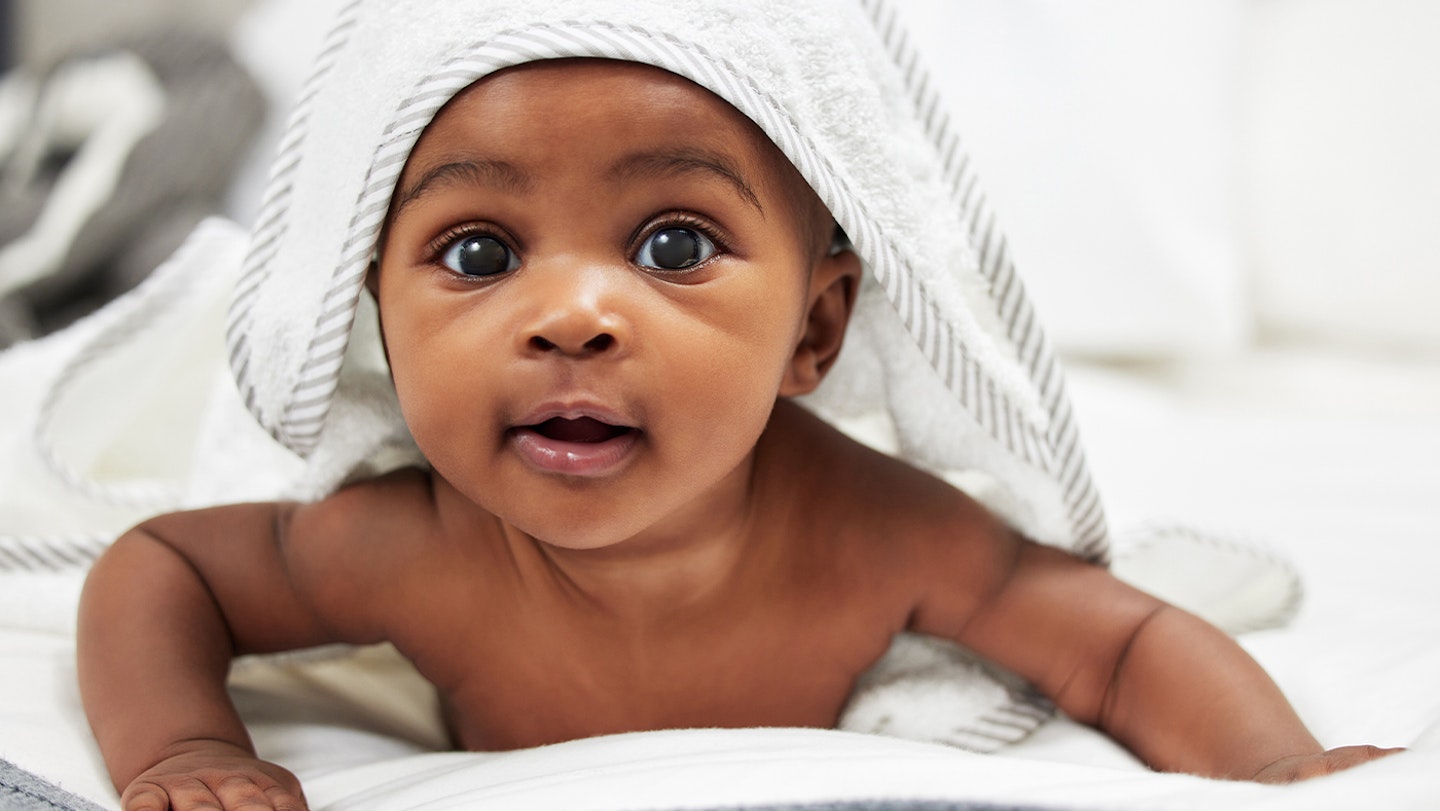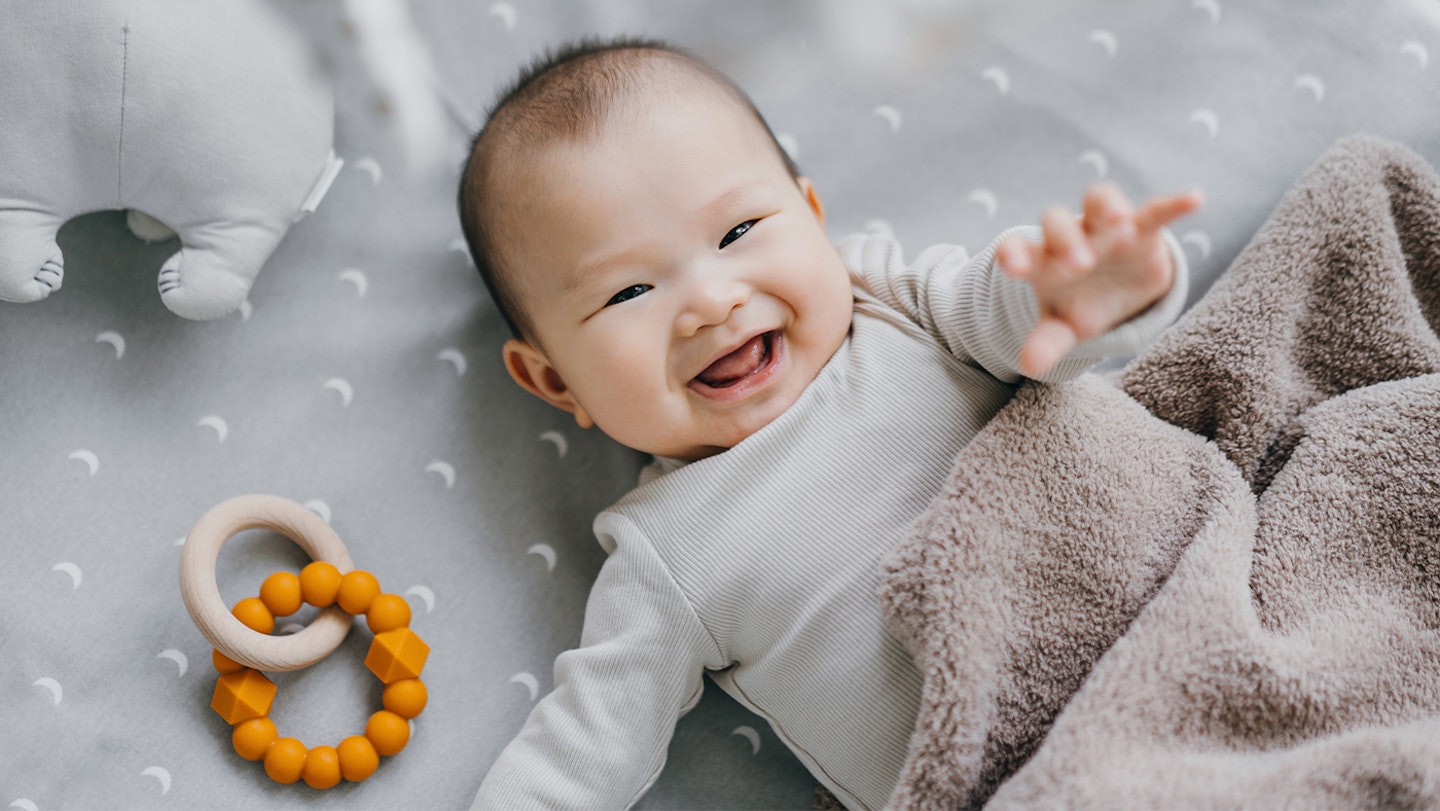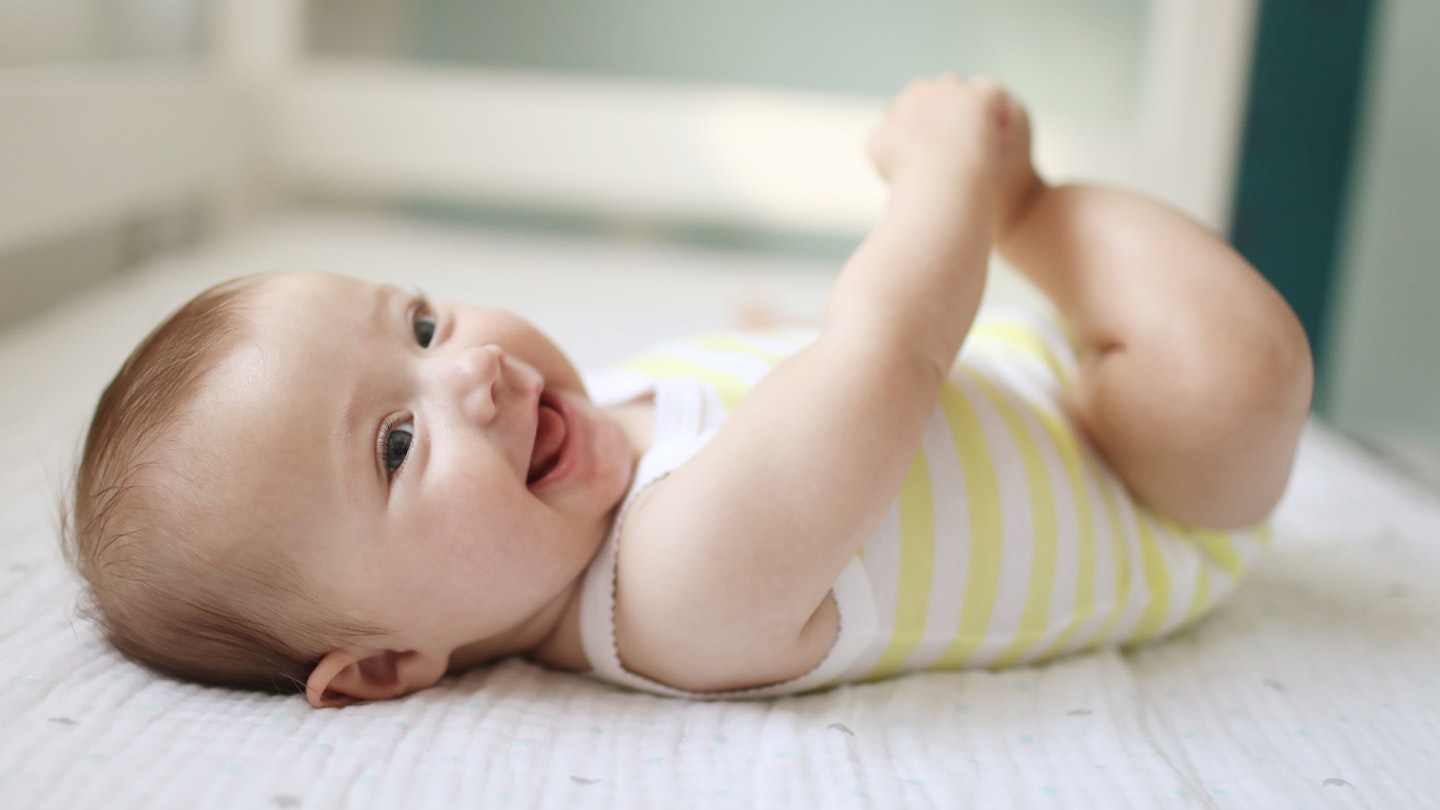Medically Reviewed by: Dr Alexis Missick
The past 3 months have probably felt like a whirlwind and you now have a 3 month old baby. Not only has your baby grown a lot bigger, but their brain power is developing at a rapid rate too.
This next month will be very exciting for you and your little one. Your 12-week-old baby is no longer a newborn (*sobs*), and you can expect longer sleep, more smiles and a much happier bundle of joy as they reach their baby development milestones.
Your baby's 3 month old development and milestones
Cognitive development
They'll need plenty of love and hugs to develop their brains at this age. According to Dr Alexis, you may notice your baby is beginning to recognise certain people. "At 3 months, babies can recognise familiar faces and objects even from a distance. They pay more attention to body parts like mouth, feet, fingers and toes." You might notice your baby is also trying to talk as they start to make more noises with their mouths. They may begin to laugh, too, and your baby is probably smiling at you regularly. Reading your baby's regular bedtime stories and playing them music during the day will also help develop their brains.
Physical development
"At three months, babies will have better head control, and when sitting, they may start to hold their head up." Says Dr Alexis. "During tummy time, they may attempt to roll from front to back, lift their heads or use their hands to push up their chest." Dr Alexis continues. Continuing with tummy time this month is a good idea to strengthen those neck muscles further. The baby may even attempt to roll over, too, but it'll still be a while before the baby starts to walk! Things like play gyms, sensory toys and activity mats can help develop these physical and cognitive skills further, so it's a good idea to incorporate some play time each day, too. Before you know it, your baby willsit up and begin crawling at around six months!
Your 3 month old baby's health
3-month-old baby growth
As a new parent, worrying about your child's growth is normal. During the third month, many parents have similar worries as their baby goes through their first big growth spurt: 'Is my baby putting on too much weight?' 'Are they gaining enough weight?' To ease your mind, it's always advised to speak to your health visitor or doctor about your concerns. Your baby's height and weight chart may also come in handy for this.
While it's important not to put yourself under pressure as a parent and remind yourself that all babies are different, your child's growth and weight are very important. If your doctor has any concerns, they may advise you to alter how you feed your baby.
If your baby gains weight too rapidly in the first six months of their life, they may be at an increased risk of childhood obesity, which could potentially lead to becoming overweight as an adult.
3-month-old baby health
There are a few health concerns that are fairly common in three-month-old babies and are worth being informed about.
Eczema
Your baby's delicate skin is very sensitive. If you notice any dry, flaky skin or a rash, it could be a sign of infant eczema. Most commonly, it begins around the scalp and face in most babies. If they have darker pigmented skin, a rash may appear more grey, purple or red in colour. For babies with lighter-pigmented skin, rashes are likely to appear pink or red in colour.
Sun protection
At three months, your baby should remain out of direct sunlight. If you've been blessed with a summer baby and this is easier said than done, applying a baby-safe sun cream of SPF 30-50 on your baby is okay. Key areas to protect are their faces, hands and feet.

Ear infections
Babies can often develop ear infections when they catch a cold or other respiratory infection that can affect the ears, causing the lining of the ear tubes to swell and become congested with fluid. They can cause a lot of discomfort and pain to your baby, so if you notice them pulling at their ears and any signs of discomfort, it's a good idea to contact your doctor, as they may need some antibiotics.
Skin rashes
You want to be alert when it comes to spotting baby rashes and eczema. While most rashes will go away by themselves after a few days, it's a good idea to see your baby's doctor if the rash doesn't go away or if your baby is experiencing other concerning symptoms.
How long should a 3-month-old sleep?
Although you won't find a baby sleeping through the night just yet, their sleep patterns are changing. "At 3 months, baby may sleep 14-17 hours a day, with fewer daytime naps than at age 6 weeks; usually about 2-3 naps a day, " says Dr Alexis. Babies at this age tend to wake up every two to four hours for a feed. The good news is they should get into a regular sleep routine by four months old.
How often should a 3-month-old eat?
You should let your baby feed as much as they want during this month. "At 3 months, babies may feed up to 8 times a day, especially breastfed babies. Bottle-fed babies feed a bit less, but roughly every 3-4 hours, with nappy changes 8 to 12 times a day. " Says Dr Alexis. As a general guide, they should have four ounces of pumped breast milk or formula every three to four hours over a 24-hour period. While you still have a few months left until you have to think about weaning, babies begin teething around the three-month mark, with symptoms kicking in around this time. It's a good idea to check a baby teeth growth chart around this time to know what order you can expect to see little teeth popping up.

Things to think about at 3 months and looking out for you
Your recovery
Not only has your baby now grown out of the newborn stage, but at 3 months, your body is likely to feel like it's now fully recovered from birth. Once you've been given the green light from your doctor, you may begin to feel more confident about physical exercise. A walk with the pram each day is a great way of easing your way back into regular exercise and will help benefit your mental health. If the weather isn't great, you might even want to take your baby for their first baby swimming lesson!
You time
While the thought of leaving your baby with a caregiver may seem a little scary, it's important to schedule some time with your partner or friends. Having this time is great for your mental well-being and health, and you should never feel guilty for occasionally prioritising your own needs. Your caregivers will also be overjoyed to have some cuddle time with your baby too. If you're unable to find friends or family who can take care of your little one every now and then, it's a good idea to have a look on the internet or ask any local parents if they have recommendations.
Consider a schedule
During the first three months, you really can't plan for anything. But now your baby is settling into life, you can start to implement a bit of a schedule and routine. While it's important to not be too strict with this routine, things like having a bath at the same time of day and having a walk at the same time of day can really help baby ease into a regular daily pattern.
About the expert:
Dr Alexis Missick is an experienced General Practitioner who works with UK Meds. Dr Missick has worked in the NHS for over 10 years and has 6 years of experience working internationally, mostly in the Caribbean. Her approach in General practice is to prioritise helping patients better understand their health and engage in the process of improving it. She empowers her patients via patient education to share in their journey to better patient health. She has lots of experience and knowledge relating to hair loss.
Lorna White is the Products Editor for Mother&Baby. After running the Yours magazine website, specialising in content about caring for kids and grandchildren, Lorna brought her expertise to Mother&Baby in 2020. She has a keen interest in a range of topics, from potty training and nutrition to baby names and early development, and has a wide range of experienced medical experts and professionals at her fingertips. In her spare time, she enjoys spending time with her two young sisters, dog walking and enjoying the outdoors with her family.
